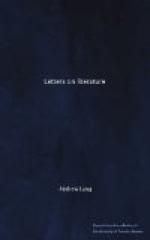“In front of a chateau of the time of Henri IV., a chateau with peaked lichen-covered roofs, with a facing of red brick varied by stonework of a paler hue, lay a wide, green lawn set round with limes and elms, and through the leaves fell the golden rays of the setting sun. Young girls were dancing in a circle on the mossy grass, to the sound of airs that their mothers had sung, airs with words so pure and natural that one felt one’s self indeed in that old Valois land, where for a thousand years has beat the heart of France.
“I was the only boy in the circle whither I had led my little friend, Sylvie, a child of a neighbouring hamlet; Sylvie, so full of life, so fresh, with her dark eyes, her regular profile, her sunburnt face. I had loved nobody, I had seen nobody but her, till the daughter of the chateau, fair and tall, entered the circle of peasant girls. To obtain the right to join the ring she had to chant a scrap of a ballad. We sat round her, and in a fresh, clear voice she sang one of the old ballads of romance, full of love and sadness . . . As she sang, the shadow of the great trees grew deeper, and the broad light of the risen moon fell on her alone, she standing without the listening circle. Her song was over, and no one dared to break the silence. A light mist arose from the mossy ground, trailing over the grass. We seemed to be in Paradise.”
So the boy twisted a wreath for this new enchantress, the daughter of a line of nobles with king’s blood in her veins. And little brown, deserted Sylvie cried.
All this Gerard remembered, and remembering, hurried down to the old country place, and met Sylvie, now a woman grown, beautiful, unspoiled, still remembering the primitive songs and fairy tales. They walked together through the woods to the cottage of the aunt of Sylvie, an old peasant woman of the richer class. She prepared dinner for them, and sent De Nerval for the girl, who had gone to ransack the peasant treasures in the garret.
Two portraits were hanging there—one that of a young man of the good old times, smiling with red lips and brown eyes, a pastel in an oval frame. Another medallion held the portrait of his wife, gay, piquante, in a bodice with ribbons fluttering, and with a bird perched on her finger. It was the old aunt in her youth, and further search discovered her ancient festal-gown, of stiff brocade. Sylvie arrayed herself in this splendour; patches were found in a box of tarnished gold, a fan, a necklace of amber.
The holiday attire of the dead uncle, who had been a keeper in the royal woods, was not far to seek, and Gerard and Sylvie appeared before the aunt, as her old self, and her old lover. “My children!” she cried and wept, and smiled through her tears at the cruel and charming apparition of youth. Presently she dried her tears, and only remembered the pomp and pride of her wedding. “We joined hands, and sang the naive epithalamium of old France, amorous, and full of flowery turns, as the Song of Songs; we were the bride and the bridegroom all one sweet morning of summer.”




